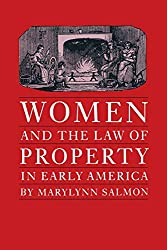A few months ago, I actually sat down and made time to actually read one of the books that’s been on my shelf for some time. That caused me to purchase a few new books and pull one that I’ve been meaning to read for some time and put it on my short list. I’m intentionally avoiding reading genealogy “how-to” books for a while in place of some historically based materials.
On my reading list:
- Women and the Law of Property in Early America, by Marylynn Salmon, University of North Carolina Press.
- Masterful Women: Slaveholding Widows from the American Revolution through the Civil War, by Kirsten E. Wood, University of North Carolina Press.
- The Ties That Buy: Women and Commerce in Revolutionary America, by Ellen Hartigan-O’Connor, University of Pennsylvania Press.
- They Were Her Property: White Women as Slave Owners in the American South, Stephanie E. Jones-Rogers, Yale University Press.
- Voices of Emancipation: Understand Slavery, the Civil War and Reconstruction through the U. S. Pension Bureau Files, by Elizabeth A. Regosin and Donald R. Shaffer, New York University Press.
- Homicide Justified: The Legality of Killing Slaves in the United States and the Atlantic World, by Andrew T. Fede, The University of Georgia Press.
I’ve actually finished They Were Her Property: White Women as Slave Owners in the American South. It was an easy read and focused more on the perspective of the female slave owner than the slave, drawing upon court records, published materials, and interviews of ex-slaves conducted during the 1930s as a part of the Federal Writer’s Project. While the fact that white women owned slaves should come as no surprise to genealogists with ancestors in the antebellum South, the book goes into some detail about the way white women handled their slaves. Of particular interest to me was the legal machinations done to ensure white women retained their ownership of enslaved individuals–but Jones-Rogers does not get buried into the legal details as much as I would like. That said, for the genealogist who wants an overview without getting mired in legalities too much, it’s a good read. The book though paints a realistic portrait of slave holding in the South.
Masterful Women which I’m approximately one-fifth of the way through, is a more dense read and takes a more academic tone. However, it delves a little into the legal details of slave ownership, focusing on widows and not on married women. It’s not a breezy read (at least not for me) and I’ve found myself actually referring to footnote as I read it or Googling a word, phrase, or historical event to make certain I’m understanding things correctly.
Women and the Law of Property in Early America is one I have seen others refer to and when I saw it referenced I decided to add it to my reading list. It is organized by legal topic–making it an easier reference than the others that are on the list. I’ve browsed a few portions of it and it seems very readable but I have no doubt there will be some terminology I’ll have to brush up on while reading it.
Voices of Emancipation: Understand Slavery, the Civil War and Reconstruction through the U. S. Pension Bureau Files I stumbled upon while reading They Were Her Property. I really didn’t do too much delving into the endnotes of They Were Her Property as I read it, but there was a section where it “felt” like that sort of detail would come from a pension application and Regosin and Shaffer’s was referenced. Having read a fair number of materials from Civil War Union pension applications, the book appealed to me from that perspective.
The Ties That Buy is a study of women and commerce in early America. I’ve not even peeked at it yet.
Homicide Justified: was purchased some time ago because it referenced a relative who murdered a slave. It’s on my to-read list, but the reference to the situation in which I have an interest was a summary of two newspaper articles that I have already located. I am hoping the text gives me some additional insight when I begin going through the court records that I have located after the early 19th century murder of a slave in Bedford County, Virginia.
I’ll be interested in hearing comments from readers who happen to have these materials on their genealogical/historical bookshelf.



No responses yet